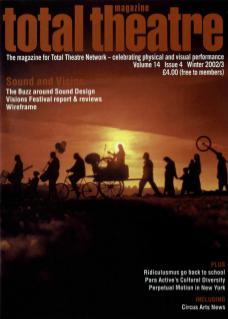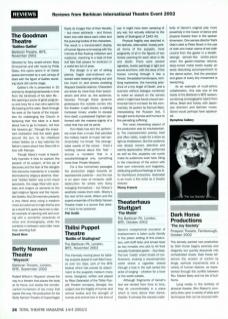Robert Wilson's Woyzeck shows the way to a theatre that places the body at its focus, but resists the remote control humanism of too many that aspire this way. His production for the Betty Nansen Theatre of Copenhagen floats its images free of their literality – but never arbitrarily – and throws them into orbit about each other and the pursuing bodies of the characters. The result is a transcendent display of human figures schmoozing with the memes of free-floating militarism and medicine, marching to a beat of that dull fate that passes for eroticism in a world too full of peas.
The design is a set of sliding planes; fragile over-endowed windowed walls keeping nothing out and too much in; and arrows prodding Woyzeck towards violence. Characters are driven by more than their associations and drive us, the audience, likewise. Through these dynamic grotesques the outside comes into the theatre: a split Doctor, a walking Cartesian binary unable to escape from itself, a possessed Captain performed with the massive dignity of a robot that has wet its pants.
Tom Waits has lent the performers more than a music that parodies the military march of music hall sentimentality: his throat. The strangulated vowels of the voices – there's nothing natural about this 'fate' – accuse a murderer that is a social/philological one, something more than Private Woyzeck.
For a few momentary passages the production edges towards an expressionist pastiche – and the text is an open maw of romantic (self) destruction for artists who fancy indulging themselves – but Wilson's aesthetic resists them both. Misery's the river of the world. Wilson and the superb ensemble of the Betty Nansen Theatre make it a source that doesn't have to be poisoned.

